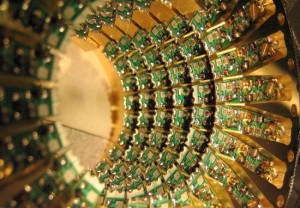The supercomputers of tomorrow might not be quite as speedy as was once hoped. Since their inception in the 1980s, quantum computers have promised to usher in a new era of super-fast number-crunching by taking advantage of the exotic properties of quantum-scale particles. But now, researchers at the National Institute of Standards and Technology (NIST) in Maryland, USA, have refined the upper speed-limit of quantum processors, and it’s not as fast as was previously thought.
Classical computers use transistor ‘bits’ to encode information, which can take either of two states, 0 or 1. But computer manufacturers are beginning to reach a fundamental limit on the number of bits they can physically cram in, preventing the creation of ever more powerful computers needed in fields such as climate forecasting.
Quantum computers are one possible solution. Instead of bits, they use quantum bits or ‘qubits’, single atoms or photons that are isolated from the rest of the world  and can therefore exist in a ‘superposition’ of states, 0 and 1. When many of these qubits are ‘entangled’ together this allows them to be used for multiple calculations at once. At least, that’s the theory. In practice, it’s very difficult to build a working quantum computer, not least because nobody really understands the mysterious properties of the quantum world.
and can therefore exist in a ‘superposition’ of states, 0 and 1. When many of these qubits are ‘entangled’ together this allows them to be used for multiple calculations at once. At least, that’s the theory. In practice, it’s very difficult to build a working quantum computer, not least because nobody really understands the mysterious properties of the quantum world.
One uncertainty relates to how quickly information can be transferred between qubits, which depends upon the time required for them to become ‘entangled’. In 2005, research suggested this was proportional to the logarithm of the quantum system’s size, meaning that entanglement could potentially be sped up exponentially by long-range qubit interactions. But in a paper just published in Physical Review Letters, the NIST researchers have proven that the required time increases much more sharply, placing a much stricter speed-limit on the quantum processor.
This isn’t all bad news. The new result represents another step forward in our understanding of the quantum property of entanglement,and pinning down their potential performance may help us, eventually, to build more efficient quantum computers.